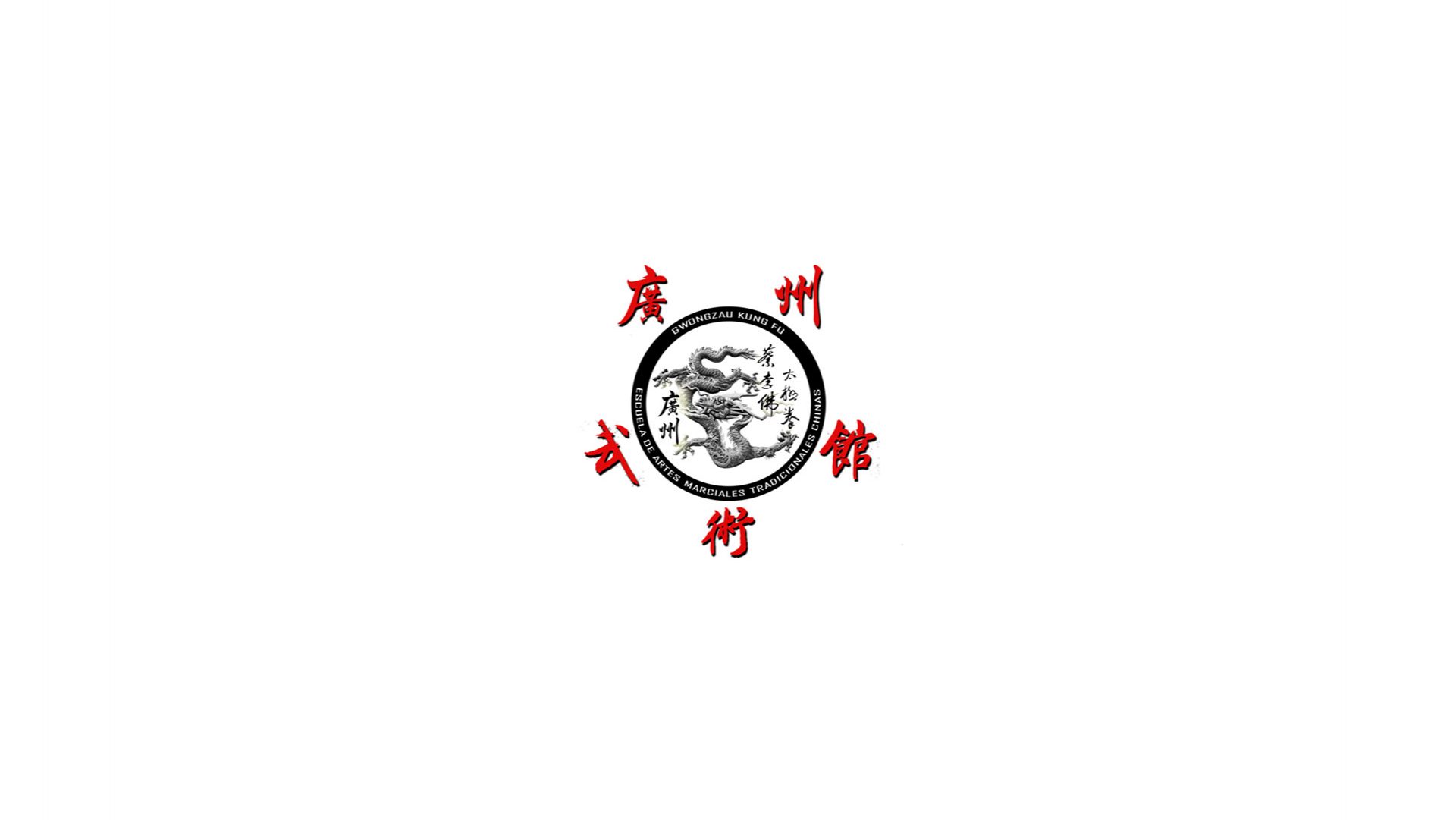"The art of war is based on deception"
(兵者詭道也 bīng zhě guǐ dào yě),
Sūnzǐ 孫子.
Introduction:
In the Chinese mentality, the idea of winning without a fight has been prevalent in the arts of war since the remotest antiquity. In the Chinese classic Sūn Zǐ Bīngfǎ 孫子兵法 (Master Sūn's Principles of War, better known as "The Art of War") it is said that the best victory is the one that subdues the enemy without fighting, avoiding self-exhaustion.
The Thirty-Six Stratagems (三十六計 Sānshíliù Jì) is a book that collects the knowledge of the Chinese people in this regard, listing a series of strategies or tricks to impose themselves in a war conflict, which any military leader and strategist should know. These strategies have been used throughout Chinese history, from ancient to modern times.
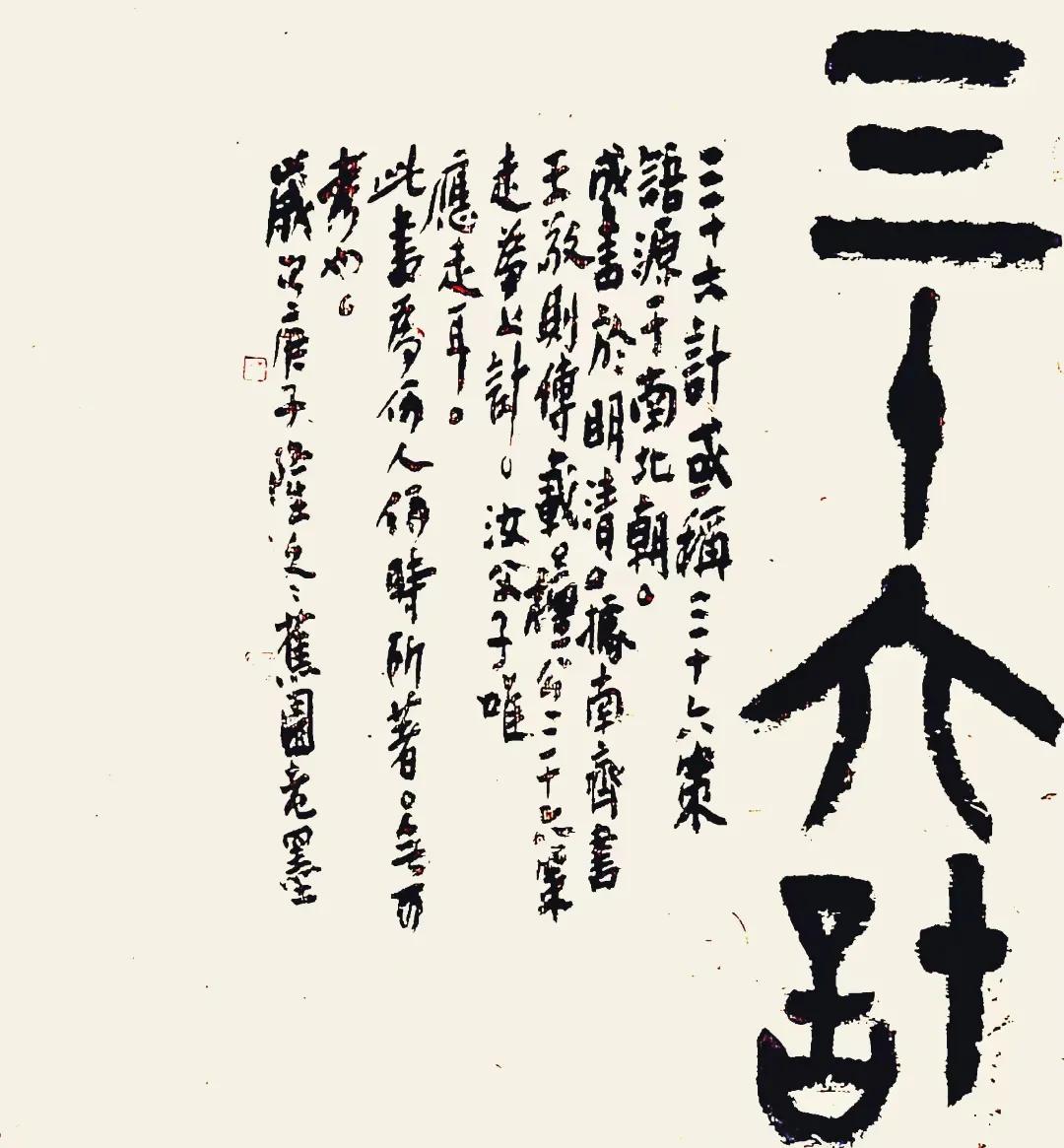
The Thirty-Six Stratagems
It is not clear when the text we know today as The Thirty-Six Stratagems was written, nor who wrote it. It has been attributed to Sūnzǐ, and to the famous strategist of the Three Kingdoms period (三國時代 Sānguó Shídài) Zhūgě Liàng 諸葛亮, but these attributions to almost legendary characters are a common practice in China to give legitimacy to a text, and are totally unfounded. Probably the text was compiled throughout history by different authors.
The Thirty-Six Stratagems draws from an oral and written tradition of popular knowledge based on both history and myth.
Origin of the title
At the end of the fifth century, General Wáng Jìngzé 王敬則 of the Southern Qí dynasty 南齊 began a rebellion. Upon learning that Wáng had taken up arms, the crown prince fled, to which Wáng mocked by saying, "Of Mr. Tán's thirty-six strategies, retreating is considered the best (檀公三十六策,走為上計 Tán gōng sān shí liù cè, zǒu wéi shàng jì)".
Wáng was referring to an episode in which, at the beginning of the same century, General Tán Dàojì 檀道濟 was forced to retreat before the troops of the Northern Wèi 魏 dynasty. However, Wáng's comment was a way of sarcastically expressing the crown prince's cowardice. This episode is collected in the Book of Qí (齊書 Qí Shū), which records dynastic history.
Despite what it may seem, we should not see in Wáng Jìngzé's commentary a reference to the book The Thirty-Six Stratagems. Quite the contrary: it is the title of the book that refers to Wáng's commentary.
In the Yì Jīng 易經 (Book of Changes, better known by the Wade-Giles transcription, I Ching), the number 6 refers to yīn 陰, the dark, a quality shared by war stratagems, which must remain in the shadows. Multiplying this number by itself yields the number 36, which metaphorically expresses an infinite or very high number. Thus, when Wáng referred to "the thirty-six strategies of Tán," he was referring to his innumerable tricks.
Despite referring to an indeterminate number, in The Thirty-Six Stratagems there are precisely 36 strategies that are mentioned.
At the heart of Chinese warfare lies the idea that there is a natural law for war, on which stratagems are based. War, like the rest of reality, is constantly changing. The Yì Jīng tries to predict these changes, which follow natural laws. In a way, the 36 stratagems are intended to be an extension of the concepts of Yì Jīng; in fact, in the text, 29 of the 36 strategies mentioned refer to the hexagrams of the Yì Jīng.
Before applying any of the war stratagems it is strictly necessary to know in depth the circumstances of both oneself and the enemy, or else the strategy will fail.
The Thirty-Six Stratagems is divided into six chapters, each of which contains six stratagems. The chapters classify stratagems according to the situation in which they are useful: when in a situation of superiority, strategies for confrontation, strategies for attack, strategies for confusing situations, strategies for gaining ground, and strategies for desperate situations.
Each strategy is referred to, poetically, in four characters, except in the last chapter, in which the six strategies refer in three characters each.
We are not going to reproduce the text of the book here, but we are going to list each stratagem, briefly commenting on its meaning.
Chapter I: Stratagems for Situations of Superiority (勝戰計, shèng zhàn jì)
- Deceive the heavens to cross the sea (瞞天過海 mán tiān guò hǎi)
The first scheme is based on deceiving the opponent by making repeated false moves. The enemy will be alerted the first time, but their alert level will decline as the move is repeated. When the enemy lowers his guard completely, the real action will take place.
- Besiege Wèi to save Zhào (圍魏救趙, wéi Wèi jiù Zhào)
It is based on dividing the enemy's forces to win. This strategy takes its name from a time when the army of the state of Wèi 魏 was besieging Hándān 邯鄲, capital of the kingdom of Zhào 趙. Zhào, in a desperate situation, requested help from the state of Qí 齊.
Instead of heading to Hándān, Qí mobilized his troops towards Dàliáng 大梁, the capital of Wèi. When the army besieging Hándān received the news, its best units were forced to leave the site to come to defend the capital. On the way they were ambushed and defeated at Guìlíng 桂陵 by Qí's troops. This intelligent move was the work of the brilliant strategist Sūn Bìn 孫臏, considered a descendant of Sūnzǐ and author of a well-known military treatise, the Sūn Bìn Bīngfǎ 孫臏兵法 (Sūn Bìn's Principles of Warfare). The maneuver allowed to save the kingdom of Zhào and gave name to this stratagem.
- Killing with a borrowed knife (借刀殺人 jiè dāo shā rén)
It is about attacking the enemy using the strength of a third party. It can be resorted to when using one's own strength is not favourable or, also, in case of having doubts about our allies, forcing them to finish off our enemy.
- Calmly wait for [the enemy's] exhaustion (以逸待勞 yǐ yì dài láo)
It consists of reserving one's own forces while the enemy is exhausted. It is about presenting battle with the fresh and rested troops when those of the enemy are exhausted. In Master Sūn's Principles of War, we read:
凡先處戰地而待敵者佚,后處戰地而趨戰者勞。
fán xiān chǔ zhàn dì ér dài dí zhě yì, hòu chǔ zhàn dì ér qū zhàn zhě láo.
Whoever arrives first on the battlefield and waits for the enemy, will be fresh to fight; the last to arrive has to rush into battle and will be exhausted.
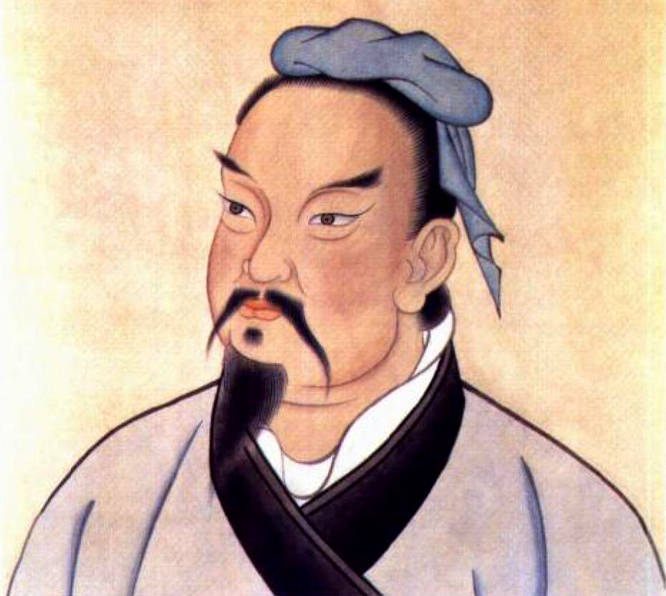
Sūnzǐ 孫子.
- Taking advantage of the fire to plunder (趁火打劫 chèn huǒ dǎ jié)
It refers to taking advantage of the enemy's difficulties to attack him mercilessly when he is weak. In the same way, one's position must be protected without revealing any vulnerability, especially when our position is not secure, to prevent the enemy from taking advantage of us.
- Make noise in the east, strike in the west (聲東擊西 shēng dōng jī xī)
As the name itself suggests, it consists of pretending to attack from a place other than the target, so that the enemy, when reinforcing that site, leaves the real objective of the attack unprotected.
Chapter II: Stratagems to Confront the Enemy (敵戰計, dí zhàn jì)
- Turning non-existence into existence (無中生有 wú zhōng shēng yǒu)
It is about confusing the judgment of the enemy, creating the illusion of danger where there is none, and vice versa. As an example, this strategy was employed by General Zhāng Xún 張巡 of the Táng 唐 dynasty in the defense of Yōngqiū 雍丘 during the rebellion of Ān Lùshān 安禄山.
The troops defending the city had run out of arrows and their situation was very difficult. Zhāng Xún ordered to make more than a thousand straw mannequins, which they dressed as soldiers and brought them down from the city walls one night. The troops besieging the city dropped a rain of arrows on the straw dummies, believing them to be enemy soldiers. Filled with several thousand enemy arrows nailed to them, the straw men were raised, replenishing the city with projectiles.
The next night, Zhāng Xún brought down the straw mannequins again. This time only a few arrows were fired. On the third night, the men who descended the wall were no longer fake. The enemy, who did not expect an attack, was surprised by General Zhāng's men, who set fire to the camp and to the besiegers' provisions.
- Sneak across to Chéncāng (暗渡陳倉 àn dù Chéncāng)
This scheme is similar to "Make noise in the east, strike in the west." It is about simulating an attack by one place to attack by another, which is unprotected.
This stratagem is also known as míng xiū zhàn dào, àn dù Chéncāng 明修棧道,暗渡陳倉, "openly repair the plank road, sneak across to Chéncāng". This saying comes from an episode that occurred in the third century BC. Liú Bāng 劉邦, governor of the state of Hán 韓, who would later found the Hàn 漢 dynasty, was fighting for hegemony with Xiàng Yǔ 項羽.
Liú Bāng's troops, led by General Hán Xìn 韓信, were to cross the mountainous areas of the state of Shǔ蜀, which corresponds to current Sìchuān 四川. There had been a road built with planks on the walls of the cliffs, known as the "Shǔ plank road" (蜀棧道 Shǔ zhàn dào). But this road had previously been destroyed by Liú Bāng himself.
General Hán Xìn began to openly repair the plank road, thus causing the enemy to position its army in that area. Meanwhile, he commanded troops along an ancient path surrounding the mountains and attacked by surprise the enemy garrison established at Chéncāng, seizing a key place and thus scoring a strategic victory in the war.
- Looking at the fire from the other shore (隔岸觀火 gé àn guān huǒ)
In this case, "fire" refers to the enemy's internal problems. This strategy proposes that, when the opponent shows signs of internal discord, one should wait and watch rather than act, since an attack at that time could cause the different enemy factions to unite again. It is about waiting for the enemy to destroy himself from within while preserving one's own forces.
This scheme is in direct contradiction to "Take advantage of the fire to plunder." To correctly discern which of them to use, the specific circumstances must be carefully assessed; if deciding to attack, it must be done in a fulminating way and without giving the enemy time to recover. However, note also that "Taking advantage of the fire to plunder" is presented as one of the stratagems to use in a situation of advantage.
- Hide a knife behind a smile (笑裏藏刀 xiào lǐ cáng dāo)
As the expression itself indicates, it is a question of camouflaging true intentions under an appearance of benevolence, in order for the enemy to relax his vigilance and, in the meantime, to prepare in a hidden way and attack by surprise.
In the same way, one should be suspicious of friendly signs coming from the enemy.
- Sacrifice the plum tree to preserve the peach (李代桃僵 lǐ dài táo jiāng)
It consists of sacrificing something of lesser value in order to preserve that which is essential; or suffer some harm to obtain a greater benefit.
- Taking the opportunity to steal a goat (順手牽羊 shùn shǒu qiān yáng)
"Taking the opportunity to steal a goat" expresses the idea that, when circumstances put something within our reach effortlessly, we should take it, however little its value may be. It also means taking unscrupulous advantage of the enemy's mistakes.
In battle you have to be able to take advantage of the opponent's mistakes or openings. It doesn't matter how small that mistake is; if there is a benefit, however minimal, it should be taken advantage of without hesitation. However, obtaining this benefit should not be an obstacle to the achievement of the final objective.
Chapter III: Offensive Stratagems (攻戰計, gōng zhàn jì)
- Hitting the grass to scare the snake (打草驚蛇 dǎ cǎo jīng shé)
It refers to sound out the situation to expose the position and actual forces of the enemy. This strategy highlights the importance of prior recognition of any offensive action; before acting, the strength of the opponent must be known. "Hitting the grass" is any action that forces the enemy to respond, revealing their situation. The grass, and not the snake, is beaten to understand the circumstances of the snake.
- Borrow a corpse to revive the soul (借屍還魂 jiè shī huán hún)
It consists of making use of those people in a situation of weakness, from whom one can take advantage to increase one's own power.
- Lure the tiger out of the mountains (調虎離山 diào hǔ lí shān)
When the position of the enemy is impregnable, any attack on him is doomed to fail and deplete our forces. In this case, the tiger must be made to leave its lair, that is, the enemy must be made to leave, by means of a bait, to a more exposed position.
- If you want to capture it, let it go (欲擒故縱 yù qín gù zòng)
When the enemy is surrounded, he will fight fiercely if pressed too hard. This strategy consists of leaving the enemy an open escape route, so that his troops, tired, lose their morale and the will to fight.
- Throw a brick, receive jade (拋磚引玉 pāo zhuān yǐn yù)
In popular parlance, this expression means offering modest ideas to get valuable suggestions in return. Similarly, it refers to throwing a bait at the enemy to obtain a greater good. However, the bait must be camouflaged, or else this trick will not work.
- To apprehend the thieves, captures their king (擒賊擒王 qín zéi qín wáng)
It refers to destroying the core of the enemy's strength to obtain a lasting victory. If the leader of the enemy formation is brought down, his entire internal structure will collapse.
The expression "To apprehend the thieves, capture their king" comes from a poem by Dù Fǔ 杜甫 of the Táng Dynasty, one of the most famous poets in Chinese history. In his poem entitled Leaving for the Border: Nine Odes (前出塞九首 qián chū sāi jiǔ shǒu), we read the following lines (ode number 6):
挽弓當挽強,
wǎn gōng dāng wǎn qiáng,
When you draw a bow, make sure it is strong,
用箭當用長。
yòng jiàn dāng yòng cháng.
and that the arrows you use are long.
射人先射馬,
shè rén xiān shè mǎ,
To shoot a man, shoot his horse first,
擒賊先擒王。
qín zéi xiān qín wáng
to catch the enemy [literally, the thief], first catch his leader [his king].
殺人亦有限,
shā rén yì yǒu xiàn,
To kill men, there is a limit,
列國自有疆。
liè guó zì yǒu jiāng.
and there are borders between the kingdoms.
苟能制侵陵,
gǒu néng zhì qīn líng,
If invasions are kept under control,
豈在多殺傷。
qǐ zài duō shā shāng.
no more deaths are necessary.
Although the expression of this scheme has been drawn from this poem, the strategy itself has been used since time immemorial.
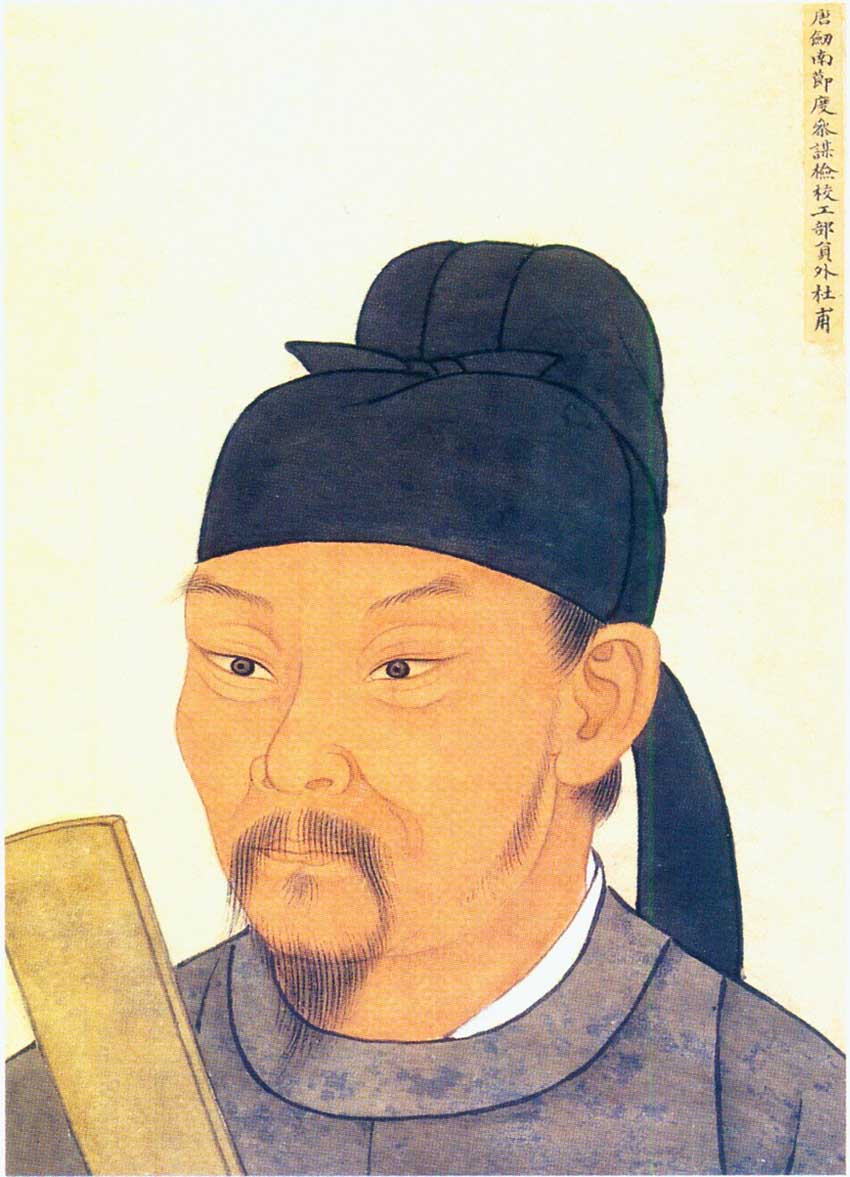
Dù Fǔ 杜甫.
Chapter IV: Stratagems for confusing situations (混戰計 hùnzhàn jì)
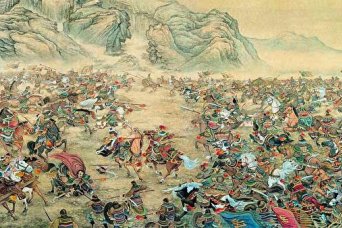
- Remove the wood from under the cauldron (釜底抽薪 fǔ dǐ chōu xīn)
This scheme applies when the enemy's strength is superior and a direct confrontation is not feasible. Wood is the fuel that nourishes the flame under the cauldron. In this way, one way to apply this strategy would be to cut off the enemy's supply lines so that the enemy is not able to maintain its combat strength.
- Stir the waters to catch the fish (渾水摸魚 hùn shuǐ mō yú)
This strategy is sometimes referred to as 混水摸魚 hùn shuǐ mō yú, although the meaning is the same.
It is a matter of stirring or muddying the waters, that is, of stoking the internal disorder of the enemy to cause confusion within him, taking advantage of the situation. If the enemy is not in disarray, action must be taken to cause it.
- Golden cicada molts the skin [leaves its shell] (金蟬脱殼 jīn chán tuō qiào)
This trick refers to making movements while appearing to be still. It is particularly useful in a situation in which one cannot win and must withdraw; in this case it consists of retreating stealthily, without provoking the enemy to a chase. The appearance must be created that the troops maintain their position, when in fact they are already in motion.
But it is not only used in retreat; also when advancing. The cicada seems to be there, but it's just the empty shell; in reality, the cicada has already left the place.
- Close the door to catch the thief (關門捉賊 guān mén zhuō zéi)
It is the opposite scheme to "If you want to capture it, let it go", and it consists, then, of destroying an enemy that is surrounded. As always, before deciding on one or the other strategy, the specific circumstances must be assessed. This stratagem will be used when the enemy is weak or at a numerical disadvantage; in case of facing a strong enemy which is prepared to fight, the opposite strategy should be applied, allowing a way out. Destroying the enemy now that he is weak also prevents him from being able to rebuild and cause damage in the future.
- Befriend those at a distance, attack those nearby (遠交近攻 yuǎn jiāo jìn gōng)
This scheme refers to allying with distant states while waging war with those that are closest. One of the reasons is that it is not convenient to send armies at remote distances, since costs are increased, forces are driven away from nearby enemies, and the supply lines are endangered by being exposed to them. In addition to the difficulty of maintaining occupation forces in distant territories. Therefore, it is considered more practical to ally with distant states to attack nearby enemies, and gradually gain ground.
- Borrow a road to attack Guó (假途伐虢 jiǎ tú fá Guó)
It means taking advantage of the danger of a small kingdom and conquering it under the pretext of helping it. The best opportunity presents itself when the small country is attacked by a third party, or there is an imminent risk of an attack.
It is a strategy to justify the actions of conquest; the small state asks for help from a larger one and the latter obtains a justification to send troops that, once inside, will take control.
The origin of this expression comes from a story recorded in the Hánfēizǐ 韩非子, which happened in the Spring and Autumn period (春秋時代 Chūn-Qiū Shídài). The state of Jìn 晋, which wished to conquer the smaller states of Yú 虞 and Guó 虢, requested passage to Yú through its territory to attack Guó. The ruler of Yú, despite having been advised against it, granted passage to Jìn's troops in exchange for jade and horses. Jìn's army conquered Guó in a short time and then attacked and subdued Yú.
Chapter V: Combined stratagems (並戰計 bìng zhàn jì)
- Steal the beams and replace them with pillars (偷梁換柱 tōu liáng huàn zhù)
Actually, the meaning of this expression is "to replace the beams with rotten woods". It refers to altering the structure of the enemy's formation, causing the enemy to frequently change its battle formation, and attacking key structures so that the formation collapses.
- Pointing to the mulberry tree to criticize the acacia (指桑罵槐 zhǐ sāng mà huái)
As the name suggests, it is about indirectly criticizing or sending a message by acting on a third party.
- Feigning madness while maintaining balance (假痴不癲 jiǎ chī bù diān)
This is a strategy to use in a situation of weakness. It is about feigning stupidity or madness to avoid the attack of the enemy, preventing him from perceiving us as a threat and lower his guard.
In the Romance of the Three Kingdoms (三國演義 Sānguó Yǎnyì) it is said that Sīmǎ Yì 司馬懿, a great strategist who had been the highest-ranking officer under Cáo Cāo 曹操 and his immediate successors, was relegated from his posts by Cáo Shuǎng 曹爽, for fear that Sīmǎ Yì, due to the power he was accumulating, became a threat to him.
According to this story, Cáo Shuǎng sent a messenger to inquire about Sīmǎ Yì's state of health. When he received the messenger, Sīmǎ Yì performed a masterful performance feigning senility, appearing unable to dress himself or drink tea without spilling it all over.
In the face of this news, Cáo Shuǎng completely let his guard down. Shortly afterwards Sīmǎ Yì staged a coup d'état, seizing total power.
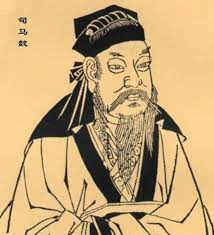
Sīmǎ Yì 司馬懿.
- Send them to the roof and remove the ladder (上屋抽梯 shàng wū chōu tī)
As inferred from the name, it is about bringing the enemy down into a position where he is isolated, so that he is vulnerable.
It can also be used to instigate one's own troops for battle, making them face the enemy with no possibility of retreat, so that victory is the only possible way out, just as general Xiàng Yǔ, mentioned above, did after crossing the Yellow River (黃河 Huáng Hé) to face the troops of Qín 秦. Xiàng Yǔ ordered to sink the boats, burn the tents and take only provisions for three days. His soldiers fought with such courage that, despite being inferior in number, they won a great victory against Qín.
- Decorate the tree with [fake] flowers (樹上開花 shù shàng kāi huā)
It is about creating an illusion of superiority, making the enemy believe that our forces are greater than they really are. In this case, and despite using this ploy, confrontation should be avoided.
- Change from guest to host (反客為主 fǎn kè wéi zhǔ)
"Change from guest for host" means becoming the host having started as a guest or, what is the same, going from a passive position to taking absolute control. From a position of friendship, one progressively gains influence within the rival state, with patience, until taking control when circumstances are favourable.
Chapter VI: Stratagems in the face of defeat (敗戰計 bài zhàn jì)
- Stratagem of the beautiful woman (美人計 měi rén jì)
As can be deduced, this scheme made use of feminine beauty to seduce or corrupt someone, weakening the opponent's will to fight or distracting him from his obligations as ruler. Although it may seem exaggerated to this day, this strategy proved tremendously effective on more than one occasion.
In addition, women could be sent as concubines to become spies or assassins.
- The empty fortress stratagem (空城計 kōng chéng jì)
It is used in a situation of inferiority, in which there is no possibility of victory. It consists of showing one's own vulnerability to the enemy in an exaggerated way, to the point of confusing him and making him distrustful.
However, in history there are few examples of a successful application of this stratagem; the name comes from a fictional episode of the Romance of the Three Kingdoms, between Zhūgě Liàng and Sīmǎ Yì, of whom we have already spoken above. Zhūgě Liàng was stationed with a small garrison at Xīchéng 西城, when Sīmǎ Yì advanced with a large army upon the fortress. There was no escape; any flight attempt would have been a resounding defeat.
Faced with this desperate situation, Zhūgě Liàng ordered to open the gates of the fortress and hide from the soldiers. He ordered a few of them to dress as civilians and perform cleaning tasks by the gates, and he himself went up to the wall to play the lute. When Sīmǎ Yì arrived at the fortress and found the doors open and without any sign of hostility, he was very suspicious and, fearing a ruse from his enemy, decided to retreat. This saved the life of the Xīchéng garrison for which, if Sīmǎ Yì's troops had entered, there would have been no chance of resisting.
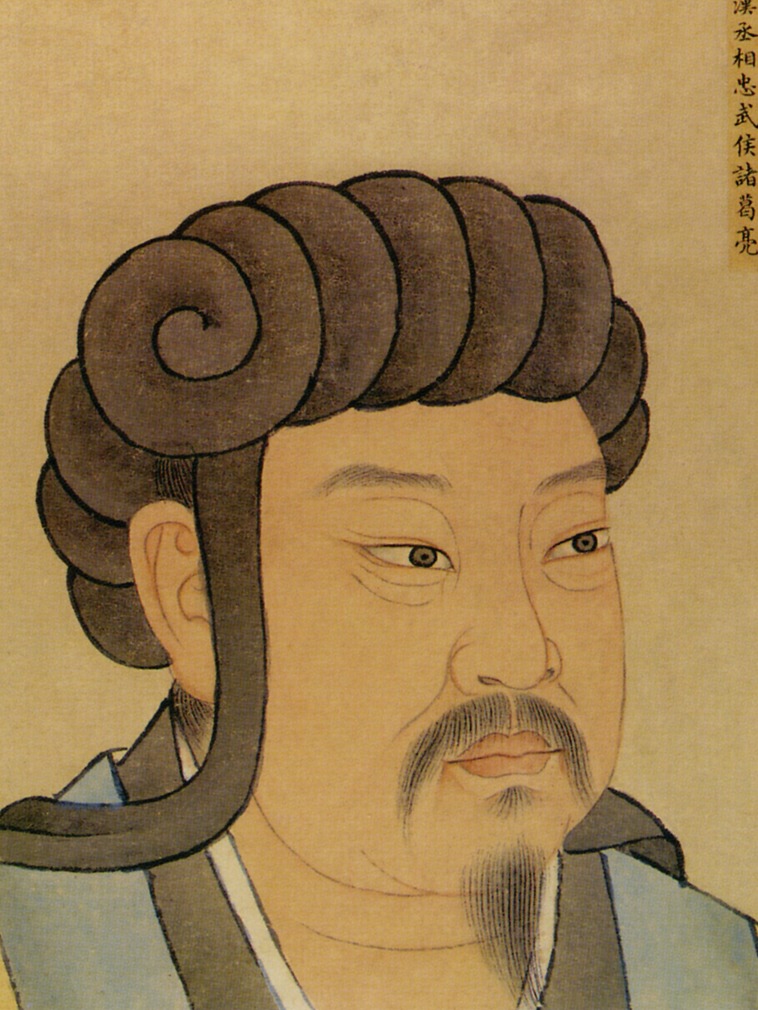
The famous strategist Zhūgě Liàng 諸葛亮.
- The stratagem of sowing discord (反間計 fǎn jiàn jì)
It consists of circulating false information among the enemy ranks to sow distrust between their own side.
- The stratagem of self-injury (苦肉計 kǔ ròu jì)
It is about self-inflicting damage to deceive the enemy, gaining their trust by making them believe that the damage received comes from a mutual enemy. In the famous Battle of the Red Cliffs (赤壁之戰 Chìbì zhī zhàn), General Huáng Gài 黃蓋 pretended to surrender to the enemy, but before, he was whipped in public to the point of losing consciousness, so that his surrender would be credible. Through deception, he gained the trust of his rival by causing him to fall into an ambush.
This is an especially cruel scheme, since the damage inflicted has to be real to convince the enemy, but indeed a really effective one.
- Chained stratagems (連環計 lián huán jì)
It is about using different stratagems simultaneously, without relying in a single one of them, so that if one fails, there are others at stake.
- If everything else fails, retreat (走為上 zǒu wéi shàng)
The Chinese are a pragmatic people. In the Chinese mentality there is no idea of an honorable death, if it does not serve a greater good. Therefore, there should never be a battle if it cannot be won; in such a case, the right decision is to withdraw.
There is no dishonor in retreat; leaders must be able to judge when circumstances are favourable and when they are not, and withdraw in time to avoid total defeat. Retreating makes it possible to avoid unnecessary damage, and to preserve the troops to present battle again when circumstances improve, thus leaving open the possibility of a future victory.
Conclusion:
The Thirty-Six Stratagems collects Chinese wisdom concerning the art of war. From their perspective, war actions are eminently practical and must be guided by a careful calculation of costs and benefits.
As we have already mentioned, to apply the aforementioned stratagems it is necessary to make a correct assessment of the circumstances, taking into account that they are changing, and to be willing to be flexible and modify them when necessary. If a scheme is applied unconsciously, it is doomed to fail.
All these stratagems are very old but are not limited to any time or space. They have been and are also used in modern times by the leaders of countries around the world and are even applied in the business world.
